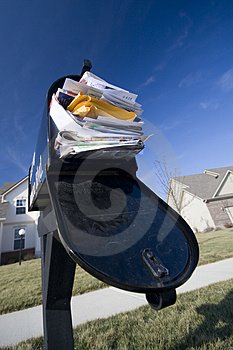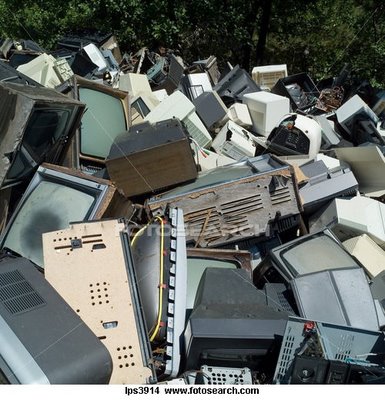
Last week, a mail miracle occurred.
I didn't get any.
Sitting on my front porch with a book (yes, made from paper), I watched in wonder as our friendly neighborhood carrier passed by and said "nothing today."
I was flabbergasted.
Dumbfounded.
Non-plussed.
We at Thin Green Line's Corporate Mega-Headquarters and luxury green spa were puzzled because we have not yet done what we put on our "to do" list months ago -- sign up with
41 pounds.orgWe should. After all, what's not to like?
For $41, they stop all junk mail to your house for five years.
No credit card offers to shred or unwanted catalogs; one-hundred-plus trees not harvested to make the junk; 28 billion gallons of water kept clean.
And, more than two-thirds of the fee you pay is donated to the green charity of your choice.
(We are compelled to report here that, sadly, despite vociferous argumentation by the Thin Green Line's financial team -- all of whom have paid their taxes, for the most part -- those snobs at the IRS insist we are not a charity and you cannot name us at the "charity of your choice." Apparently, we also do not qualify for a government bail-out despite making many, many financial mistakes with other people's money. Sad as this no doubt makes you, believe you us, it makes US much sadder.)
Anyway, back to our over-burdened mailman. Despite his tendency to deliver unwanted bills, he's a great guy who unfortunately is tasked with carrying a whole lot of other stuff we don't want; in other words, junk mail.
Now those in the business like to call it "direct mail," as in mail that goes "direct"ly into the trash.
There is a little less of it these days, primarily because a national credit crisis has a tendency to dry up myriad credit card offers from companies that no longer feel safe giving credit to Fort Knox, much less environmentalist losers trying to make a better world.
But let's not kid ourselves, its out there...waiting... and, like an Arnold Schwarzenegger cameo in the next Terminator movie, it will be back!
So now comes the spot in our blog where we bombard you with numbers to prove our incontrovertible point; numbers carefully researched by a guy sitting at home in sweat pants reading
The New York Times.
According to our crack research department, producing junk mail produces more carbon dioxide than nine million cars.
Now those readers who did not respond to Earth Hour's call last month to shut down all unnecessary lighting for one-hour by declaring in self-righteous (and mildly paranoid) defiance that you would turn on lights you don't even own, probably know that nasty old CO2 is the planet's number one greenhouse gas.
In fact, our (unwitting) research partners at the Times inform us
here that a
recent report by Forest Ethics -- with the fabulously clever title of "Do Not Mail: Climate Change Enclosed" -- found "mail advertisements create 51.5 million metric tons of greenhouse gases each year — equivalent to the emissions generated by heating about 13 million homes during the winter, or mowing more than 20 billion lawns. "
Worse yet, only about 40 percent of junk mail gets recycled, probably because those of us who cannot afford to have our credit rating get any worse have to systematically shred each of those sounds-too-good-to-be-true-because-they-are credit card offers to prevent dumpster divers from stealing our slightly tarnished good name.
Those who (literally) bring you your junk mail, the U.S. Postal Service, are doing their part, installing 4,000 recycling stations near post office boxes so as much can be captured there as possible.
The Post Office is even urging direct mailers to follow their lead, providing
a list of things they can do to green their product such as providing people the chance to "opt out" of being on their list and using recycled paper and biodegradable inks for their product.
But those direct mailers are a stubborn lot.
View here, if you have the stomach for it, an interview with Michael J. Critelli, 59, executive chairman of the mailing company
Pitney Bowes, who uses a defense for junk mail that is as time-honored as it is disingenuous, best summarized as "we're not as bad as our competition."
Critelli argues that the trees used to make junk mail are replaced with new trees (so no harm, no foul); that junk mail makes up only 2 percent of landfill waste (what's 2 percent among friends?); and that spam, the bastard off-spring of junk mail, has an even greater environmental cost because of all the electricity those computer serves require.
All of which is completely true and, of course, completely besides the point.
To take the last point first, for this argument about spam to have weight, you have to assume that doing away with junk mail results in an increase in spam. We took a poll here at the Thin Green Line office tower complex and decided we could live with doing away with both. It also presumes we'll swallow in slack-jawed conformity that because the harm the other guy is causing is worse, we won't care about the harm you are doing.
This line of logic was dis-proved once and for all in the famous case of Crook Vs. Homeowner, renowned for the burglar's famous line, "hey pal, you should stop worrying that I'm stealing your TV, because I saw your neighbor kick your cat!"
Further, there is an environmental cost to harvesting those junk mail trees, replaced or not, and such mono-culture replants are rarely as diverse or as stable as old-growth forests; not to mention the greenhouse gases emitted by the chainsaws, loaders, helicopters (yes, we've seen it on The History Channel so it must be true) and paper mills.
Lastly, we doubt anyone would argue that reducing landfill waste by another two percent would be anything but a good thing.
Besides, how can you take seriously a guy who, when asked if some Americans like to get junk mail, replied "absolutely."
Forgive us, Mr. Critielli, if, when we ask ourselves this leading question -- "Do you think a guy whose salary is paid by junk mail will say anything to defend it no matter how damning the evidence of its harm?" -- we answer by saying "absolutely."
Now, if you all will excuse me, I have the clear the junk mail off my dining room table.
Labels: 41 Pounds, Forest Ethics, New York Times, Pitney Bowes, U.S. Postal Service


